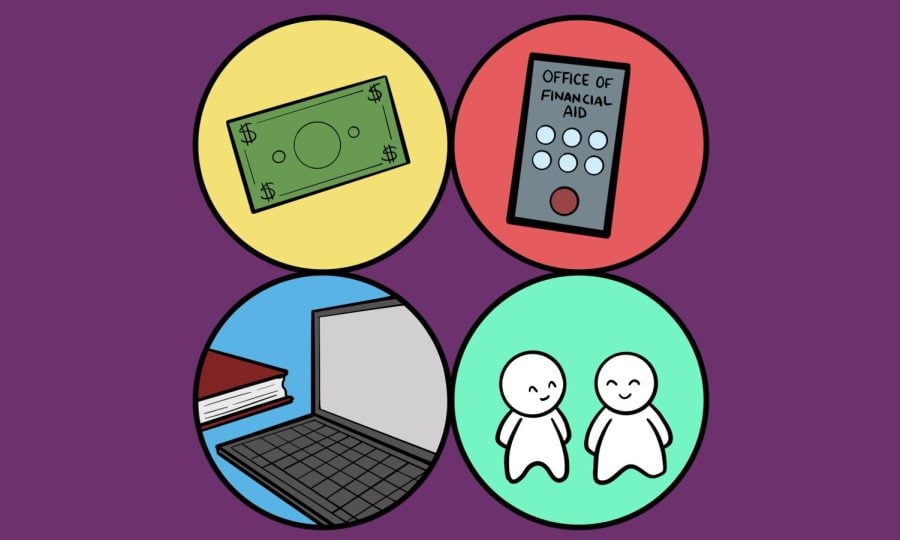Calling all incoming First-Generation/Low-Income students: Here’s how to survive Northwestern on a budget
Imposter syndrome, budgeting and financial aid are all terms you should be aware of if you’re a first-generation/low income student entering campus this fall.
August 12, 2022
While Northwestern hosted $16.1 billion worth of net assets at the end of 2021’s fiscal year along with an abundance of financial aid for first generation/low-income students, most of those at NU are wealthy enough to attend and pay part or all of the rising tuition. In turn, that makes low-income students the minority. If you identify as FGLI, here are some tips and tricks to deal with attending an institution with an abundance of wealth and an environment that isn’t always conducive to accommodating your needs.
Resources on campus
Student Enrichment Services has “calling all First Generation, Lower-Income, and/or Undocumented/DACA students” plastered on its front web page because the organization is specifically dedicated to servicing students within these categories.
Money for smaller items, like books, laptops, winter gear and clothing all the way up to emergency aid assistance, food accessibility and research grants can all be applied for through SES’ website. You can also use the SES One Form to apply for various funding, ranging from mini course subsidies to research funding.
SES also works to combat food inaccessibility through the Purple Pantry, a free grocery and snack service that works with Mary Deeley, the pastoral associate at the Sheil Catholic Center. The Purple Pantry is open every Thursday between 11:00 a.m. and 2:00 p.m. by appointment.
Budgeting
Creating a budget helps immensely with tracking funds even when money is tight.
Categories you might want to consider include food, rent/utilities, transportation, miscellaneous and savings/emergency funds. These four groups constitute necessities for budgeting, as college students likely draw from all four at some point during the year.
You should budget using a personalized format that will hold you the most accountable. For instance, some may use a bullet journal — a highly organized way of keeping track of your life — and others keep a list of their expenses in the notes app. I use Google Sheets to track my spending because it’s easily accessible but doesn’t sacrifice the organizational aspect of budgeting. Financial literacy involves trial and error, so don’t be afraid to play around with expense tracking until you find a style that works best.
If your primary form of income is through a quarterly refund, keep in mind that there might be a moment at the end of the quarter when you are low on money and will need to access savings. The same goes for if your primary source of income is through a job; certain times of the month will result in reduced funds depending on pay schedules, so setting aside emergency monies is always a good idea.
Lastly, credit cards are useful to have, but it can be easy to rack up debt when credit is readily accessible. Pay close attention to how much you’re spending using your credit card to make purchases, and ensure you have enough money in your bank account to pay it off monthly.
Remember that Northwestern’s SES is accessible via email to aid you in budgeting and debt management.
Keeping in contact with the Office of Financial Aid
If and when problems arise with your account, it’s important to keep in touch with the financial aid office to ensure your aid is secure. Additionally, NU requires an annual Free Application for Financial Student Aid submission along with parental income forms to determine how much money you receive every year. It is worthwhile to keep up to date with this information so you are getting the money you deserve from the University.
For further questions, schedule an appointment with a financial aid counselor.
Imposter syndrome and communicating with friends
Psychologist Susan Albers defines imposter syndrome as “the feeling that everyone else knows exactly what they’re doing, but you feel lost.”
NU students often fall into the imposter syndrome trap due to elitist tendencies — like making overworking a competition — that permeate throughout the University along with the difficulty of classes. If you suspect imposter syndrome is affecting your confidence, know that you are not alone and that time and experience will allow you to feel differently down the road.
When you are feeling overwhelmed at NU, it’s worthwhile to confide in friends who feel the same way and/or did not attend high schools that prepared them well for NU. Many FGLI students are not used to the rigor of coursework nor the preparedness of their peers who attended preparatory schools. Know that your success is not defined by the accomplishments of others but rather how you handle the cards you are dealt.
Email: [email protected]
Twitter: @swarthout_iris
Related Stories:
— FGLI students say they often struggle transitioning to NU’s STEM courses
— Compass peer mentor program gives FGLI students a place to call home
— Benavides: I have hope that more FGLI students will change our campus for the better


